英语泛读教程3全文翻译
TheEnglishReserveandPoliteness翻译英语泛读教程3(高等教育出版社)

参考译文1. 课文一2. 课文二Text 1The English Reserve and PolitenessIt seems to many people that the British are extremely polite and difficult to make friends with. Hopefully the following passage will help you to have a better understanding of the British character.To other Europeans, the best knownquality of the British is "reserve". A reserved person is one who does not talk very much to strangers, does not show much emotion, and seldom gets excited. It is difficult to get to know a reserved person; he never tells you anything about himself, and you may work with him for years without ever knowing where he lives, how many children he has, and what his interests are. English people tend to be like that. If they are making a journey by bus, they will do their best to find an empty seat; if by train, an empty compartment. If they have to share the compartment with a stranger, they may travel many miles without starting a conversation. If a conversation does start, personal questions like "How old are you?" or even "What is your name?" are not easily asked. Questions like "Where did you buy your watch?" or "What is your salary?" are almost impossible. Similarly, conversation inBritain is in general quiet and restrained andloud speech is considered ill-bred.This unwillingness to communicate with others is an unfortunate quality in some ways, since it tends to give the impression of coldness, and it is true that the English课文一 英国人的谨慎和礼貌 在许多人看来,英国人极为礼貌,同他们交朋友很难。
英语泛读教程3第三册课文翻译Unit9

UNIT9梦与睡眠一样重要吗?罗杰·露易丝我们是否能根据自己的意愿来控制梦境?所有动物都能做梦吗?聋哑人和弱智者怎样做梦?下面这篇文章将讨论这些问题。
生物学家们迟早会去探究梦这个大脑最神秘的一个功能,可能是最难以触摸难以理解的人体功能。
只是在几年以前,我们以为弗洛依德从哲学家和诗人那儿拿走打开梦境之城的钥匙,并将它们永远地留给心理学家与精神分析学家。
但现在生物学家,生物化学家以及神经心理学家正在侵入这片曾经被认为是神圣不可侵犯的领地。
他们其中的一位是法国人米歇尔·儒弗博士,他在里昂医学院的研究被国际公认为同美国纳桑尼尔·克莱特曼教授的研究一样具有权威性,处于同一个层面。
克莱特曼的研究自1960年以来由他的同事威廉·第门特继续下来。
儒弗博士1958年对梦的研究产生兴趣,这或多或少是碰巧的事情,或者说,是实验性工作内含的逻辑性引起他的好奇心。
“我当时对证明巴甫洛夫的条件理论感兴趣,用猫作为实验动物,”他告诉我们。
“我们将电极植入猫爪的肌肉中,来检验某些运动,。
”“在它们的睡眠中,我们注意到了一种断续发生的出人意料的现象--肌肉紧张的完全消失,有时延续几分钟,之后肌肉紧张重新出现,而动物继续睡觉。
“我们想到了用各种可能的理论来解释这一现象。
我们甚至觉得猫须的特殊作用可能与这一现象有联系,而且我们实际上试着将猫须剪掉,看这是否起些作用。
经过长期的摸索后,我们才意识到这可能与做梦有关。
”“从那时起,我们的研究转向了对睡眠的生理研究,特别是转向了我们所指的反常阶段。
这一阶段与动物或人做梦的时期是一致的。
”“这一研究是与美国的克莱特曼和第门特等合作进行的。
不久,我们就收集了大量的信息与丰富的记录。
”“我们能从最基本点开始。
只需对酣睡中的动物或人进行体检,我们现在就能说出他是否在做梦。
更好的是,我们可以在一秒钟时间内确定他开始做梦的时刻与结束做梦的时刻。
”“对这一发现,我们有三条基本的生理学原则,现在已被所有的神经生理学家接受:1.肌肉紧张性几乎完全消失。
英语泛读教程3上课文+译文(Unit1-7)
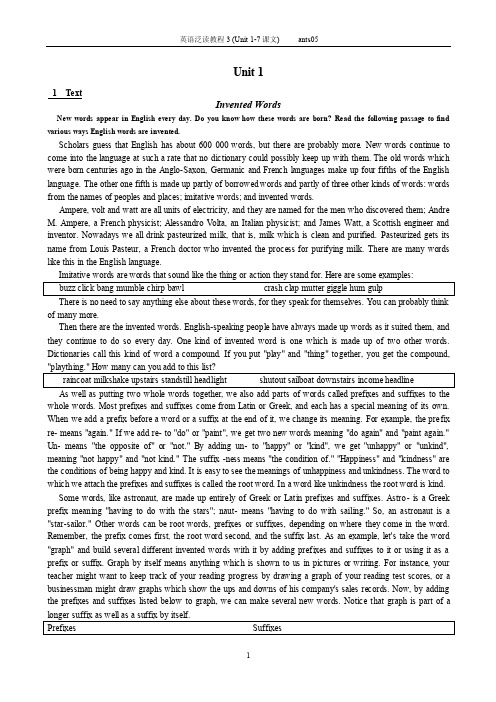
Unit 11 TextInvented WordsNew words appear in English every day. Do you know how these words are born? Read the following passage to find various ways English words are invented.Scholars guess that English has about 600 000 words, but there are probably more. New words continue to come into the language at such a rate that no dictionary could possibly keep up with them. The old words which were born centuries ago in the Anglo-Saxon, Germanic and French languages make up four fifths of the English language. The other one fifth is made up partly of borrowed words and partly of three other kinds of words: words from the names of peoples and places; imitative words; and invented words.Ampere, volt and watt are all units of electricity, and they are named for the men who discovered them; Andre M. Ampere, a French physicist; Alessandro Volta, an Italian physicist; and James Watt, a Scottish engineer and inventor. Nowadays we all drink pasteurized milk, that is, milk which is clean and purified. Pasteurized gets its name from Louis Pasteur, a French doctor who invented the process for purifying milk. There are many words like this in the English language.There is no need to say anything else about these words, for they speak for themselves. You can probably think of many more.Then there are the invented words. English-speaking people have always made up words as it suited them, and they continue to do so every day. One kind of invented word is one which is made up of two other words. Dictionaries call this kind of word a compound. If you put "play" and "thing" together, you get the compound,whole words. Most prefixes and suffixes come from Latin or Greek, and each has a special meaning of its own. When we add a prefix before a word or a suffix at the end of it, we change its meaning. For example, the prefix re- means "again." If we add re- to "do" or "paint", we get two new words meaning "do again" and "paint again." Un- means "the opposite of" or "not." By adding un- to "happy" or "kind", we get "unhappy" or "unkind", meaning "not happy" and "not kind." The suffix -ness means "the condition of." "Happiness" and "kindness" are the conditions of being happy and kind. It is easy to see the meanings of unhappiness and unkindness. The word to which we attach the prefixes and suffixes is called the root word. In a word like unkindness the root word is kind.Some words, like astronaut, are made up entirely of Greek or Latin prefixes and suffixes. Astro- is a Greek prefix meaning "having to do with the stars"; naut- means "having to do with sailing." So, an astronaut is a "star-sailor." Other words can be root words, prefixes or suffixes, depending on where they come in the word. Remember, the prefix comes first, the root word second, and the suffix last. As an example, let's take the word "graph" and build several different invented words with it by adding prefixes and suffixes to it or using it as a prefix or suffix. Graph by itself means anything which is shown to us in pictures or writing. For instance, your teacher might want to keep track of your reading progress by drawing a graph of your reading test scores, or a businessman might draw graphs which show the ups and downs of his company's sales records. Now, by adding the prefixes and suffixes listed below to graph, we can make several new words. Notice that graph is part of aYou may have noticed that you can make even other words using some of these prefixes and suffixes without graph. "Biology" is the study of life. What do you think is the meaning of "biologic"? If the prefix anti- means "against," what does "antibiotic" really mean? There are hundreds of Latin and Greek prefixes in the English language, and the possibilities for inventing new words are endless. Every day, as we make new discoveries in science and technology, we invent new words to describe them. Many of these new words are combinations of root words and prefixes and suffixes which have already existed in English for centuries.Another kind of invented word is the nonsense word. Some nonsense words are used for a while by only a few people and then disappear completely from the language, never to be used again. Others, when they become popular enough and are used over a period of time, become a permanent part of the language. If enough people decide and agree on the meaning of an invented word, it is here to stay. Some examples of everyday modern words which probably began as nonsense words centuries ago are: bad, big, lad, lass, chat, job and fun. Linguists guess that these are nonsense words because they have not been able to trace them back to any of the ancestor languages. Just who invented them, and when or where remains a puzzle. Puzzle itself is one of these mystery words. No one knows where it came from.Lewis Carroll, author of Alice in Wonderland and Through the Looking Glass, was a great inventor of nonsense words. As a matter of fact, he created a whole language of nonsense. Most of Carroll's nonsense words are not used in English, except for "chortle." Chortle, Carroll tells us, is a cross between a chuckle and a snort. The word is formed by packing two different meanings together in it. The dictionary calls such words blends. A fairly recent blend, which, unfortunately, we hear almost every day, is "smog," a combination of smoke and fog.People invent nonsense words by combining certain sounds that just seem to fit the things or actions they describe. Often we make up words for anything which is basically rather silly. Spoof was invented by an English comedian some fifty years ago. It means "to poke fun at." Hornswoggle was used a great deal in the United States during the nineteenth century, and it means "to cheat." If a dishonest politician wants to hornswoggle the taxpayers, he invents a "boondoggle," which is a useless, expensive project which does nobody any good. Fairly recently someone invented the word "gobbledygook." When people talk or write using long, fancy words that really mean nothing, we call it gobbledygook. Unfortunately, many people use gobbledygook because they want to seem more important than they are, or because they don't really want people to understand what they mean or what they are doing. So, when the dishonest politician wants to hornswoggle the public with a boondoggle, he usually explains things in gobbledygook.When Lewis Carroll was writing his books the word gobbledygook had not been invented yet, but Carroll would have known exactly what it meant. Carroll loved to spoof or poke fun at people who used fancy, important-sounding words when simple language would have done better. In one part of Through the Looking Glass, Alice has a conversation with Humpty Dumpty in which Humpty Dumpty insists words can mean whatever he wants them to mean. Alice insists that this is impossible. If everyone did that no one would understand anyone else. The conversation goes like this:"But 'glory' doesn't mean 'a nice knockdown argument'," Alice objected."When I use a word," Humpty Dumpty said, in rather a scornful tone, "it means just what I choose it to mean -neither more nor less.""The question is," said Alice, "whether you can make words mean so many different things.""The question is," said Humpty Dumpty, "which is to be the master -that's all."The question is, just as Humpty Dumpty said, which is to be master. But Humpty Dumpty used words in an odd way, and that made him a master of gobbledygook, not a master of language. A master of language knows what words really mean, and where they come from; knows when to use big, important ones and when to use the shorter, equally important simple ones. Winston Churchill was a great British prime minister. He was also a great writer, truly a master of language. He said once, "Short words are best, and old words when they are short, are best of all."(1545 words) 译文:新造词英语中每天都有新词出现。
英语泛读教程3第三版 课文翻译(Text1--1-7单元)

UNIT 1 创造性思维的艺术约翰·阿代尔创造性对人类发展至美重要。
下面的文章里,约翰·阿代尔为求实的创造性思维者提供了一些颇有见地的见解和技巧。
创造性思维在今天的重要性不需要强调。
在你的职业中或工作领域,如果你能够发展提出新思想的能力,你就有竞争优势。
在你的个人生活中,创造性思维也能将你带上创新活动之路。
它可以丰富你的人生,尽管并非总是以你期待的方式。
人类创造力人类不可能凭空创造东西。
有一次,一位来宾极为仔细地参观了亨利·福特的汽车公司,然后见到了福特。
来宾心中充满了惊奇和崇敬,他对这位实业家说:“福特先生,25年前起家时几乎一无所有的人,不可能实现这一切。
”福特回答说,“这个说法可不太对。
每个人都是靠所有拥有的东西来起家。
这里什么都有——所需要的一切,它们的基本点和实质性的东西都已存在。
”潜在的材料,也就是可以做成或建构成某种东西的元素之成分或者实质的材料,都已存在于我们的宇宙。
你可能已经注意到,我们倾向于将创造性这个词用在与使用的原材料很不一样的产品上。
鲁宾斯的一幅名作,就是蓝色、红色、黄色和绿色的蠕虫般颜料在艺术家画板上的集合。
物质材料,对艺术家来说是颜料和画布;对作家来说是纸和笔——完全是次要的。
这里的创造,更多的是在大脑之中。
感知、思想和感觉都在一种观念或想象中结合起来。
当然,艺术家、作家或作曲家还需要使用技巧和技术,在画布或纸上把头脑中构想出来的东西塑造成型。
和普通意义上的创造性一样,创造性思维遵循同样的原则。
我们的创造性想象必须有可以加工的对象。
我们不能凭空产生新的思想。
如上面福特所说的那样,原材料都在那里。
有创造力的大脑在原材料中看到可能性和相关性,而创造力不强的大脑却看不到。
这一结论让我们大大地松了一口气。
你不用凭空构想新的想法。
作为创造性思维者,你的任务是将已经存在的想法或元素组合在一起。
如果最终把人们从未想过可以联系起来的想法或事物,用看似不可能却很有价值的方式组合起来,那人们就会认为你是创造性思维者。
The English Reserve and Politeness 翻译 英语泛读教程 3(高等教育出版社)
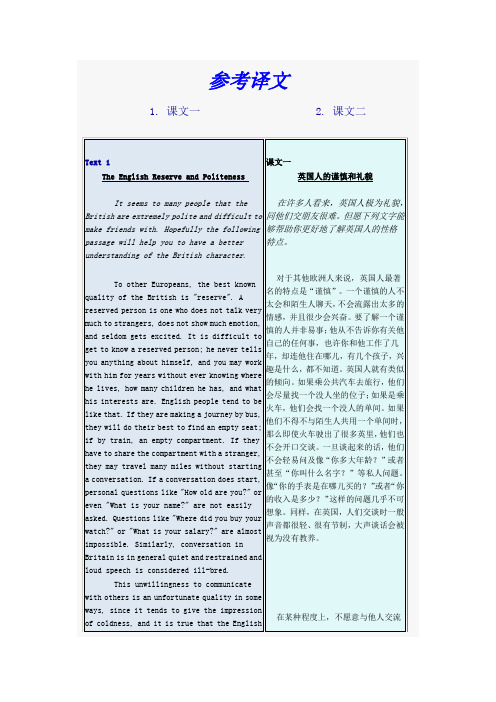
参考译文1. 课文一2. 课文二Text 1The English Reserve and PolitenessIt seems to many people that the British are extremely polite and difficult to make friends with. Hopefully the following passage will help you to have a better understanding of the British character.To other Europeans, the best knownquality of the British is "reserve". A reserved person is one who does not talk very much to strangers, does not show much emotion, and seldom gets excited. It is difficult to get to know a reserved person; he never tells you anything about himself, and you may work with him for years without ever knowing where he lives, how many children he has, and what his interests are. English people tend to be like that. If they are making a journey by bus, they will do their best to find an empty seat; if by train, an empty compartment. If they have to share the compartment with a stranger, they may travel many miles without starting a conversation. If a conversation does start, personal questions like "How old are you?" or even "What is your name?" are not easily asked. Questions like "Where did you buy your watch?" or "What is your salary?" are almost impossible. Similarly, conversation inBritain is in general quiet and restrained andloud speech is considered ill-bred.This unwillingness to communicate with others is an unfortunate quality in some ways, since it tends to give the impression of coldness, and it is true that the English课文一 英国人的谨慎和礼貌在许多人看来,英国人极为礼貌,同他们交朋友很难。
泛读教程3第二版Animal-Welfare课文翻译
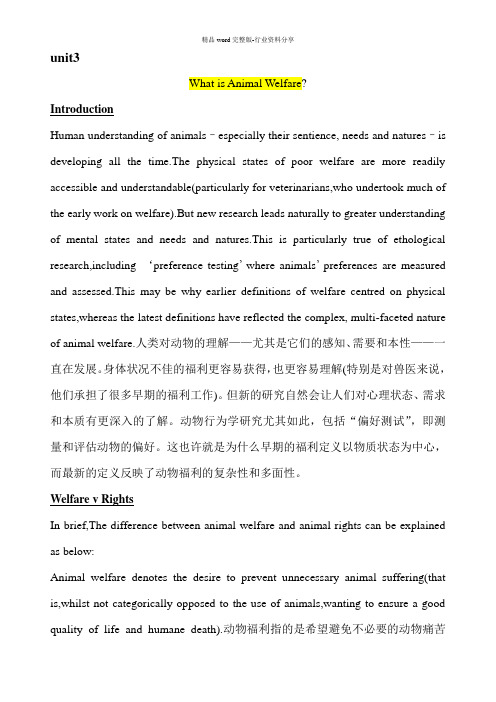
unit3What is Animal Welfare?IntroductionHuman understanding of animals–especially their sentience, needs and natures–is developing all the time.The physical states of poor welfare are more readily accessible and understandable(particularly for veterinarians,who undertook much of the early work on welfare).But new research leads naturally to greater understanding of mental states and needs and natures.This is particularly true of ethological research,including ‘preference testing’where animals’preferences are measured and assessed.This may be why earlier definitions of welfare centred on physical states,whereas the latest definitions have reflected the complex, multi-faceted nature of animal welfare.人类对动物的理解——尤其是它们的感知、需要和本性——一直在发展。
身体状况不佳的福利更容易获得,也更容易理解(特别是对兽医来说,他们承担了很多早期的福利工作)。
但新的研究自然会让人们对心理状态、需求和本质有更深入的了解。
英语泛读教程3__课文翻译

UNIT3打破魔术的气泡如今心理学家们认识到魔术师对人们如何感知世界了解甚多。
Alok Jha发现了观众是如何让自己受骗的。
人们首先感到的是震惊,略带点不信任。
接下来的一刻是惊叹。
然后,一阵很大的骚乱扭曲了大家的理智,你已经上当了。
你无法抗拒一个好的魔术的影响。
从Houdini的惊天逃生和Derron Brown虚幻的精神欺骗,再到儿童聚会上的魔术表演,无人能抵抗魔术的魅力“魔术由来已久,并与时俱进。
”来自Hertfordshire大学的心理学教授Richard Wiseman说,“一个魔术结束时,你在看的大都是一些专业技术效果。
我想心理学家们从这点可以学到很多。
但是,心理学家并不满足于欣赏魔术,现在正利用魔术对心智的影响揭秘我们如何处理涌入大脑的感官信息的洪流,以及如何将其加工成属于现实世界而又来自精神世界的画面。
魔术是一种欺骗,是对精神世界中有序画面的扰乱——物体好像漂浮在半空中,硬币或者纸牌在眼前消失。
如今科学家们相信,通过详细描绘出我们的心智是如何被欺骗的,甚至可以解开意识本身的一些奥秘。
“在过去的5年里,当我们看到诸如对变化视而不见之类的事情以及又一事实,即意识来自真实的构建,也甚至可以来自错觉的误导时,我们做了反省。
”身为技艺精湛的魔术师并为Magic Circle(魔术圈)成员的Wiseman说,“现今人们意识到了魔术师做的事非常特别。
”一些现代心理学的创始人曾对魔术师颇有兴趣:在19世纪90年代,现代IQ测试的发明者Alfred Binet和Max Dessoir 记录了关于魔术师们如何利用暗示和注意力转移让那些错觉发挥作用的方式。
1986年,Joseph Jastow在《科学》杂志上发表了关于当时大魔术师们的一些魔术使用的手法的文章。
但这些文章只是描述了魔术师所做的,无力解释为什么魔术会对观众产生这样的影响。
结果,人们对研究魔术中的心理学的兴趣消失了近一个世纪。
但是,正如Wiseman所说,这一兴趣正在全力复兴。
英语泛读教程3第三册课文翻译Unit7
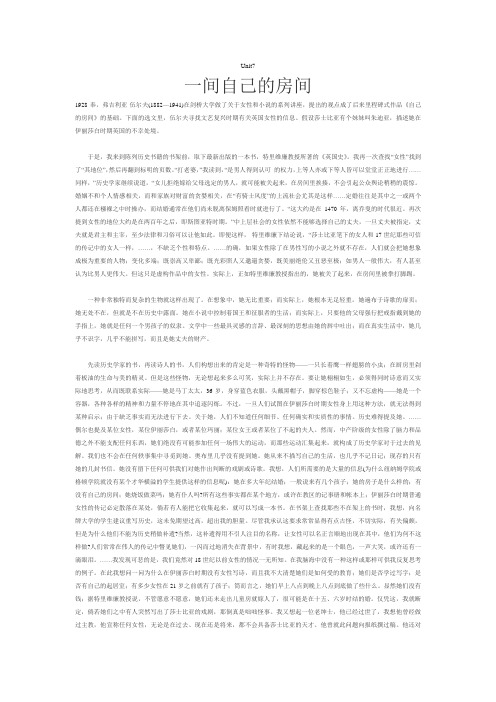
Unit7一间自己的房间1928奉,弗吉利亚·伍尔夫(1882—1941)在剑桥大学做了关于女性和小说的系列讲座,提出的观点成了后来里程碑式作品《自己的房间》的基础。
下面的选文里,伍尔夫寻找文艺复兴时期有关英国女性的信息。
假设莎士比亚有个妹妹叫朱迪亚,描述她在伊丽莎白时期英国的不幸处境。
于是,我来到陈列历史书籍的书架前,取下最新出版的一本书,特里维廉教授所著的《英国史》。
我再一次查找“女性”找到了“其地位”,然后再翻到标明的页数。
“打老婆,”我读到,“是男人得到认可的权力,上等人亦或下等人皆可以堂堂正正地进行……同样,”历史学家继续说道,“女儿拒绝嫁给父母选定的男人,就可能被关起来,在房间里挨揍,不会引起公众舆论稍稍的震惊。
婚姻不和个人情感相关,而和家族对财富的贪婪相关,在“有骑士风度”的上流社会尤其是这样……定婚往往是其中之一或两个人都还在襁褓之中时操办,而结婚通常在他们尚未脱离保姆照看时就进行了。
“这大约是在1470年,离乔叟的时代很近。
再次提到女性的地位大约是在两百年之后,即斯图亚特时期。
”中上层社会的女性依然不能够选择自己的丈夫,一旦丈夫被指定,丈夫就是君主和主宰,至少法律和习俗可以让他如此。
即便这样,·特里维廉下结论说,“莎士比亚笔下的女人和17世纪那些可信的传记中的女人一样,……,不缺乏个性和特点。
……的确,如果女性除了在男性写的小说之外就不存在,人们就会把她想象成极为重要的人物;变化多端;既崇高又卑鄙;既光彩照人又邋遢贪婪,既美丽绝伦又丑恶至极;如男人一般伟大,有人甚至认为比男人更伟大。
但这只是虚构作品中的女性。
实际上,正如特里维廉教授指出的,她被关了起来,在房间里被拳打脚踢。
一种非常独特而复杂的生物就这样出现了。
在想象中,她无比重要;而实际上,她根本无足轻重。
她遍布于诗歌的扉页;她无处不在,但就是不在历史中露面。
她在小说中控制着国王和征服者的生活;而实际上,只要他的父母强行把戒指戴到她的手指上,她就是任何一个男孩子的奴隶。
英语泛读教程3第三册课文翻译Unit10

UNIT10诚信原则罗伯特·L·舒克你有多少次违背过自己的承诺?有多少次为别人没兑现其承诺而失望?读一读下面这篇文章,你就会更好地领会什么是诚信原则,以及为什么要珍视和遵循它。
现在我们来讨论“诚信原则”:做你说过要做的任何事情。
尽管这条原则很简单,也很合理,然而大部分人却不遵守它。
一个说到做到的人是出类拔萃,难得一见的人。
我们肯定都遇到过这种情况:别人“答应”我们做一件事情,结果我们得到的只是失望。
我们都曾在某个时候因为别人没兑现承诺感到到沮丧,“我的支票还没有寄到。
”有多少次你因为裁缝没能在约定的日期把你的西服或礼服改好而失望?或许一位电脑推销员曾向你“保证”在这个月25日将Model7000 型电脑送上门,但你直到两星期后才收到它。
还记得那个承包商信誓旦旦地说你的游泳池完工将会不超过6月10日,但你直到9月2日才能第一次下池游泳?还有那次你得到承诺说你要的新车会在那个月1日送到,但过了将近四个星期后你才收到?我们都曾经受过这种失望,面对别人的失言而难过万分。
不能实现承诺是个失败的形象,你要像躲避瘟疫一样躲避它。
德怀特·奈特是镇上一家主要的法律公司的律师,聪明能干,但他是一个不遵守诚信原则的典型。
尽管作为一位公司律师他有出色的能力,但他常常不能在约定的最后时刻履约,使他靠“拿出好成果”的能力建立的信誉损失殆尽。
“当然,肯定了,”德怀特会对他的客户说,“到星期三我会将合同书最后一稿起草好的。
我绝对看不出有什么会延迟的原因。
你什么时候要?早上10点钟左右行吗?”考虑到德怀特以往的工作记录,你最好还是在派秘书去拿合同书之前给他打个电话。
情况往往是,你拨通了电话,他的接待员会说,“哦,奈特先生开会直到中午。
他午饭回来后给你去电话好吗?”到这一天结束时还没有听到他的消息,你要在离开办公室之前再给他打个电话,然而还是找不到他。
到星期四,就是约定日期的次日,他整个一天都躲着你!到星期五,你已十分恼火,当他总算让你把电话接通时,他低声下气地咕哝道,“你知道,合同书实在是比第一眼看上去难弄得多。
泛读教程3第二版bird brans课文翻译
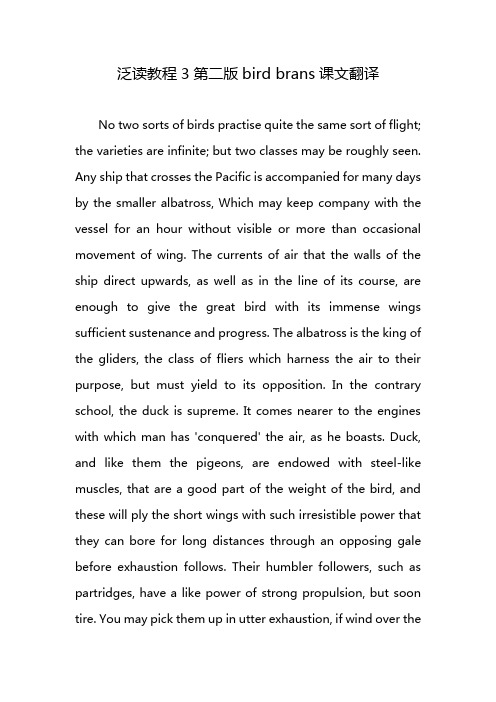
泛读教程3第二版bird brans课文翻译No two sorts of birds practise quite the same sort of flight; the varieties are infinite; but two classes may be roughly seen. Any ship that crosses the Pacific is accompanied for many days by the smaller albatross, Which may keep company with the vessel for an hour without visible or more than occasional movement of wing. The currents of air that the walls of the ship direct upwards, as well as in the line of its course, are enough to give the great bird with its immense wings sufficient sustenance and progress. The albatross is the king of the gliders, the class of fliers which harness the air to their purpose, but must yield to its opposition. In the contrary school, the duck is supreme. It comes nearer to the engines with which man has 'conquered' the air, as he boasts. Duck, and like them the pigeons, are endowed with steel-like muscles, that are a good part of the weight of the bird, and these will ply the short wings with such irresistible power that they can bore for long distances through an opposing gale before exhaustion follows. Their humbler followers, such as partridges, have a like power of strong propulsion, but soon tire. You may pick them up in utter exhaustion, if wind over thesea has driven them to a long journey. The swallow shares the virtues of both schools in highest measure. It tires not, nor does it boast of its power; but belongs to the air,travelling it may be six thousand miles to and from its northern nesting home, feeding its flown young as it flies, and slipping through a medium that seems to help its passage even when the wind is adverse. Such birds do us good, though we no longer take omens from their flight on this side and that; and even the most superstitious villagers no longer take off their hats to the magpie and wish it good-morning.没有任何两种鸟的飞行方式是相同的。
英语泛读教程unitThreeDaystoSee课文和译文

Three Days to Seeby Helen KellerHelen Keller, blind and deaf from infancy, became a successful lecturer, author and educator with the help of her teacher. In the following essay, she discussed how people should value their ability to see.All of us have read thrilling stories in which the hero had only a limited and specified time to live. Sometimes it was as long as a year; sometimes as short as twenty-four hours. But always we were interested in discovering just how the doomed man chose to spend his last days or his last hours. I speak, of course, of free men who have a choice, not condemned criminals whose sphere of activities is strictly delimited.Such stories set us thinking, wondering what we should do under similar circumstances. What events, what experiences, what associations should we crowd into those last hours as mortal beings What happiness should we find in reviewing the past, what regretsSometimes I have thought it would be an excellent rule to live each day as if we should die tomorrow. Such an attitude would emphasize sharply the values of life. We should live each day with a gentleness, a vigor, and a keenness of appreciation which are often lost when time stretches before us in the constant panorama of more days and months and years to come. There are those, of course, who would adopt the Epicurean motto of “Eat, drink, and be merry;” but most people would be chastened by the certainty of impending death.In stories, the doomed hero is usually saved at the last minute by some stroke of fortune, but almost always his sense of values is changed. He becomes more appreciative of the meaning of life and its permanent spiritual values. It has often been noted that those who live, or have lived, in the shadow of death bring a mellow sweetness to everything they do. Most of us, however, take life for granted. We know that one day we must die, but usually we picture that day as far in the future. When we are in buoyant health, death is all but unimaginable. We seldom think of it. The days stretch out in an endless vista. So we go about our petty tasks, hardly aware of our listless attitude toward life.The same lethargy, I am afraid, characterizes the use of all our faculties and senses. Only the deaf appreciate hearing, only the blind realize the manifold blessings that lie in sight. Particularly does this observation apply to those who have lost sight and hearing in adult life. But those who have never suffered impairment of sight or hearing seldom make the fullest use of these blessed faculties. Their eyes and ears take in all sights and sounds hazily, without concentration, and with little appreciation. It is the same old story of not being grateful for what we have until we lose it, of not being conscious of health until we are ill.I have often thought it would be a blessing if each human being were stricken blind and deaf for a few days at some time during his early adult life. Darkness would make him more appreciative of sight; silence would teach him the joys of sound.Now and then I have tested my seeing friends to discover what they see. Recently I was visited by a very good friend who had just returned from a long walk in the woods, and I asked her what she had observed. “Nothing in particular,” she replied. I might hav e been incredulous had I not been accustomed to such responses, for long ago I became convinced that the seeing see little.How was it possible, I asked myself, to walk for an hour through the woods and see nothing worthy of note I who cannot see find hundreds of things to interest me through mere touch.I feel the delicate symmetry of a leaf. I pass my hands lovingly about the smooth skin ofa silver birch, or the rough shaggy bark of a pine. In spring I touch the branches of trees hopefully in search of a bud, the first sign of awakening Nature after her winter's sleep.I feel the delightful, velvety texture of a flower, and discover its remarkable convolutions; and something of the miracle of Nature is revealed to me. Occasionally, if I am very fortunate, I place my hand gently on a small tree and feel the happy quiver of a bird in full song.I am delighted to have the cool water of a brook rush through my open fingers. To me a lush carpet of pine needles or spongy grass is more welcome than the most luxurious Persian rug. To me the pageant of seasons is a thrilling and unending drama, the action of which streams through my finger tips.At times my heart cries out with longing to see all these things. If I can get so much pleasure from mere touch, how much more beauty must be revealed by sight. Yet, those who have eyes apparently see little. The panorama of colour and action which fills the world is taken for granted. It is human, perhaps, to appreciate little that which we have and to long for that which we have not, but it is a great pity that in the world of light the gift of sight is used only as a mere convenience rather than as a means of adding fullness to life.If I were the president of a university I should establish a compulsory course in “How t o Use Your Eyes”. The professor would try to show his pupils how they could add joy to their lives by really seeing what passes unnoticed before them. He would try to awake their dormant and sluggish faculties.Suppose you set your mind to work on the problem of how you would use your own eyes if you had only three more days to see. If with the oncoming darkness of the third night you knew that the sun would never rise for you again, how would you spend those three precious intervening days What would you most want to let your gaze rest uponI, naturally, should want most to see the things which have become dear to me through my years of darkness. You, too, would want to let your eyes rest long on the things that have become dear to you so that you could take the memory of them with you into the night that loomed before you.I should want to see the people whose kindness and gentleness and companionship have made my life worth living. First I should like to gaze long upon the face of my dear teacher, Mrs. Anne Sullivan Macy, who came to me when I was a child and opened the outer world to me. I should want not merely to see the outline of her face, so that I could cherish it in my memory, but to study that face and find in it the living evidence of the sympathetic tenderness and patience with which she accomplished the difficult tasks of my education.I should like to see in her eyes that strength of character which has enabled her to stand firm in the face of difficulties, and that compassion for all humanity which she has revealed to me so often.I do not know what it is to see into the heart of a friend through that “window of the soul”, the eye. I can only “see” through my finger tips the outline of a face. I can detect laughter, sorrow, and many other obvious emotions. I know my friends from the feel of their faces. But I cannot really picture their personalities by touch. I know their personalities, of course, through other means, through the thoughts they express to me, through whatever of their actions are revealed to me. But I am denied that deeper understanding of them whichI am sure would come through sight of them through watching their reactions to various expressed thoughts and circumstances, through noting the immediate and fleeting reactions of their eyes and countenance.Friends who are near to me I know well, because through the months and years they reveal themselves to me in all their phases; but of causal friends I have only an incomplete impression, an impression gained from a handclasp, from spoken words which I take from their lips with my finger tips, or which they tap into the palm of my hand.How much easier, how much more satisfying it is for you who can see to grasp quickly the essential qualities of another person by watching the subtleties of expression, the quiver of a muscle, the flutter of a hand. But does it ever occur to you to use your sight to see into the inner nature of a friend or acquaintance Do not most of you seeing people grasp casually the outward features of a face and let it go at thatFor instance, can you describe accurately the faces of five good friends Some of you can, but many cannot. As an experiment, I have questioned husbands of long standing about the color of their wives' eyes, and often they express embarrassed confusion and admit that they do not know. And, incidentally, it is a chronic complaint of wives that their husbands do not notice new dresses, new hats, and changes in household arrangements.The eyes of seeing persons soon become accustomed to the routine of their surroundings, and they actually see only the startling and spectacular. But even in viewing the most spectacular sights the eyes are lazy. Court records reveal every day how inaccurately “eyewitnesses” see. A given event will be “seen” in several different ways by as many witnesses. Some see more than others, but few see everything that is within the range of their vision. Oh, the things that I should see if I had the power of sight for just three days1634 words 译文假如我有三天光明海伦·凯勒海伦·凯勒自幼就又盲又聋,在老师的帮助下成为一名成功的讲师、作家及教育家;在这篇文章里,海伦·凯勒讨论了人们应该怎样珍惜自己的视觉能力我们大家都读过这样一些惊心动魄的故事,故事中的主人公能活的时间有限而具体,或长达一年,或短至24小时;但是我们总是感兴趣的是,行将死亡的人究竟愿意怎样度过他的最后时光;当然,我说的是能进行选择的自由人,而不是活动范围受到严格限制的囚犯;这些故事启迪我们思考,诱发我们想象,当我们处于此类情况时,该怎么做呢作为常人,我们在最后的时刻会急于想干些什么,体验些什么,联想些什么呢回首往事时,我们又能领略到何种快慰,何种悔恨呢有时我想,如果我们度过每一天时都假定明天即将去世,这会是个极好的准则;这样的处世态度会强烈地突出生命的价值;我们会亲切地、朝气蓬勃地、感受强烈地来度过每一天,而这一切却往往在日复一日延续的时光与岁月之中消失;当然,有些人会奉行享乐主义“吃喝玩乐”的信条,但是大多数人则会因死亡就在眼前而心灵得到净化;在故事中,那死神呼唤的主人公通常在最后时刻交上好运而获得拯救 ,但他的价值观几乎总是发生了变化;他更加珍视生命的意义及其永恒而神圣的价值;人们常常注意到,那些生活在或者曾经生活在死亡的阴影下的人 ,对他们所做的每一件事都赋予甜美的色彩;然而,我们中间大多数人则把生命视为理所当然;我们知道,总有一天我们会死去,但通常我们又把那一天想象为遥远的未来;当我们身体健康时,死亡是件难以想象的事,我们几乎不会想到它;岁月无穷,因此我们忙于种种琐事,几乎意识不到我们漠然的生活态度;我们在使用感觉功能时,恐怕也持同样的冷漠态度;只有聋者才知道听觉的重要,只有盲人才理解视觉给人带来的各种恩赐;这一观点特别适用于那些在成年后才丧失视觉和听觉的人;而那些视觉和听觉从未受到损害的人 ,则很少充分利用这些神圣的官能;他们的眼睛和耳朵模糊地、漫不经心地、不加欣赏地纳入所有的景象和声音;还是那句老话:东西丢失后方知珍贵,直到生病时才思健康;我常常想,如果每个人在刚成年时某个时候能失明或失聪几天,这或许将是件喜事;黑暗将使他更加珍视景象;而寂静则将教他领略声音的欢乐;我不时考一考我的有视力的朋友,以了解他们看到了什么;最近一位好朋友来看我,她是在林中溜达了好一会儿才回来的,我问她观察到了些什么;“没什么特别的东西,”她答道;要不是我对类似的反应已习以为常的话,我是会觉得难以置信的;其实,我早已深信:有视力者所见甚少;我问自己,在林中溜达了一个小时而竟未看到什么值得注意的东西,这怎么可能呢我这个看不见东西的人,仅凭触摸就发现千百种使我感兴趣的东西;我感觉到树叶精致的对称;我用手爱抚着光滑的白烨树皮,或是粗糙的松树皮;春天里,我满怀希望地触摸树枝,寻找一个幼芽——大自然经过冬日沉睡重又苏醒的最初征兆;我摸着花朵上那可爱的天鹅绒般的质地,以及它那叠合巧妙的花苞,于是我领略到了某种大自然的神奇;偶尔,如果十分幸运的话,我把手轻轻搭在一棵小树上,能感到一只小鸟儿尽情欢歌的颤动;我非常高兴让清凉的溪水流过我张开的手指;对我来说,那厚密的松针层或茂盛松软的草地比豪华的波斯地毯更惬意;对我来说,四季的变幻多姿宛如一出动人心弦永不尽止的戏剧,它的情节似流水从我指尖缓缓流过;我的心时时在呼号,渴望能见到所有这一切;如果我单靠触摸就能获得如此多的乐趣,那么通过视觉则能领略到更多美景可是,那些视觉完好的人显然所见甚少;大千世界的五光十色与千姿百态被认为是理所当然;对已获得的不以为然,而对未获得的却期盼不已,这一点或许是人类的特性,可是,非常遗憾,在光明的世界里,天赐的视觉只被当作一种单纯的方便,而不是一种使生活日益完美的手段;如果我是大学校长,我就要开设一门必修课,“如何使用你们的眼睛”;教授应尽力向学生演示,如何做到真正看见那些从他们面前不知不觉溜掉的东西,从而为自己的生活增添快乐;他将尽力唤醒他们那些昏睡懒散的感官;假定你在开动脑筋研究这一问题:如果你只有三天的视力,你将如何使用你的眼睛呢如果你知道,当第三天的黑夜来临,太阳就永远不再为你升起,你将如何度过这宝贵的三天呢你最想让你的目光落在何处我当然最愿意看的,是那些在我整个失明岁月里对我已变得亲切的东西;你也会想让你的目光长久地停留在那些对你已变得亲切的东西上,这样你就可以把对它们的记忆带进那悄然而来的漫漫长夜中去;我要看看那些待我仁慈、温和、友好,从而使我的生活变得有价值的人;首先,我要好好地端详我的恩师安·沙利文·梅丝夫人的脸;她在我年幼的时候就来到我身边,替我打开了外部世界;我不仅想看她的脸形,以便能把它珍藏在我的记忆中,而且还想细细揣摩这脸容,为她那柔情与耐心找到活生生的证据,她正是怀着这种柔情与耐心完成了教育我的艰巨任务;我想在她的眼中看到那种使她坚定地面对各种困难的个性的力量,以及那种经常在我面前流露出来的对全人类的同情心;我不知道,透过"心灵之窗",即眼睛,来探视一个朋友的心是怎么回事;我只能通过我的指尖来"看"一张脸的轮廓;我能探察到欢笑、忧伤和许多其他明显的感情;我根据触摸脸庞的感觉来辨认朋友,但是我的确不能靠触摸来描绘出他们的个性;当然,我通过其他手段,通过他们向我表达的思想,通过他们向我表现出的行动来了解他们的个性;但是,我无法对他们有更深的理解,因为我确信,要达到这种更深的理解,必须要目视他们,观察他们对各种所表达的思想及情况所作的反应,留意他们眼睛里和脸上那种转瞬即逝的反应;我熟悉和我亲近的朋友,因为长年累月他们向我显露了自己的各个方面;然而对于偶尔结识的朋友我只有一种不完全的印象,这种印象是仅凭一次握手,一些言语获得的;我用指尖触摸他们的嘴唇,或是靠他们叩击我的手掌而获取这些言语;相比之下,你们这些能看见的人,通过观察表情的微妙变化、肌肉的颤动和手的摆动来迅速地把握别人的本质特点,就容易得多, 也令人满意得多;但是,你们可曾想到要用自己的视觉去看透一个朋友或熟人的内在性格你们这些有视觉的人中的大多数,不就是随便看到一张脸的外部特征就到此为止了吗举例来说,你能准确地描绘出五个好朋友的脸形吗你们中有些人可以,但许多人不行;作为试验,我曾向一些结婚多年的丈夫询问过他们妻子眼睛的颜色,但他们常常表现出尴尬困惑,承认不知道;顺便提一下,妻子们老是埋怨丈夫不注意她们的新衣服、新帽子以及房间布置中的变化;有视觉的人,眼睛很快就习惯了周围的日常事物,因此他实际上只见到一些惊人的、壮观的景象;但是,哪怕是在看最壮观的场面时,他们的眼睛也是懒洋洋的;法院记录天天都表明“目击者”所见是多么地不准确;某一事件可能被几个目击者从几个不同角度“看到”;有些人比别人看得多些,但几乎没有人看到他们视野之内的一切;哦,如果我能有即使仅仅三天的光明,我将能见到多少我想看到的东西啊。
英语泛读教程3__课文翻译 完整版
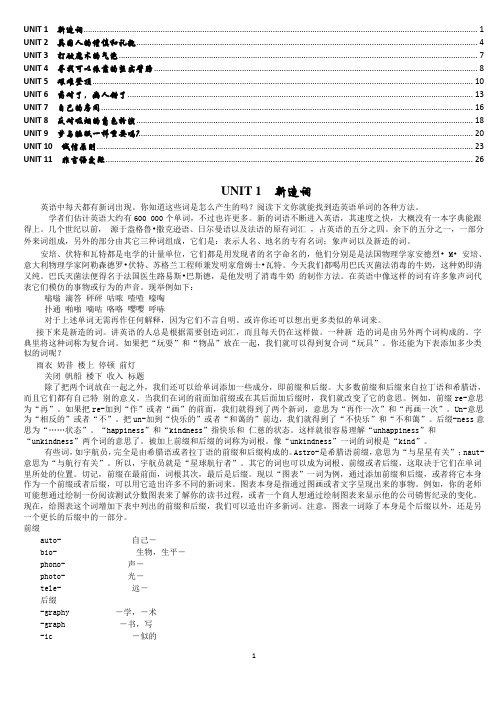
UNIT 1 新造词 (1)UNIT 2 英国人的谨慎和礼貌 (4)UNIT 3 打破魔术的气泡 (7)UNIT 4 寻找可以依靠的坚实臂膀 (8)UNIT 5 艰难登顶 (10)UNIT 6 药对了,病人错了 (13)UNIT 7自己的房间 (16)UNIT 8 反对吸烟的角色扮演 (18)UNIT 9 梦与睡眠一样重要吗? (20)UNIT 10 诚信原则 (23)UNIT 11 非言语交际 (26)UNIT 1新造词英语中每天都有新词出现。
你知道这些词是怎么产生的吗?阅读下文你就能找到造英语单词的各种方法。
学者们估计英语大约有600 000个单词,不过也许更多。
新的词语不断进入英语,其速度之快,大概没有一本字典能跟得上。
几个世纪以前,源于盎格鲁•撒克逊语、日尔曼语以及法语的原有词汇,占英语的五分之四。
余下的五分之一,一部分外来词组成,另外的部分由其它三种词组成,它们是:表示人名、地名的专有名词;象声词以及新造的词。
安培、伏特和瓦特都是电学的计量单位,它们都是用发现者的名字命名的,他们分别是是法国物理学家安德烈• M•安培、意大利物理学家阿勒森德罗•伏特、苏格兰工程师兼发明家詹姆士•瓦特。
今天我们都喝用巴氏灭菌法消毒的牛奶,这种奶即清又纯。
巴氏灭菌法便得名于法国医生路易斯•巴斯德,是他发明了消毒牛奶的制作方法。
在英语中像这样的词有许多象声词代表它们模仿的事物或行为的声音。
现举例如下:嗡嗡滴答砰砰咕哝喳喳嚎啕扑通啪啪嘀咕咯咯嘤嘤呼哧对于上述单词无需再作任何解释,因为它们不言自明。
或许你还可以想出更多类似的单词来。
接下来是新造的词。
讲英语的人总是根据需要创造词汇,而且每天仍在这样做。
一种新造的词是由另外两个词构成的。
字典里将这种词称为复合词。
如果把“玩耍”和“物品”放在一起,我们就可以得到复合词“玩具”。
你还能为下表添加多少类似的词呢?雨衣奶昔楼上停顿前灯关闭帆船楼下收入标题除了把两个词放在一起之外,我们还可以给单词添加一些成分,即前缀和后缀。
泛读教程3第二版Animal Welfare课文翻译

unit3What is Animal Welfare?IntroductionHuman understanding of animals–especially their sentience, needs and natures–is developing all the time.The physical states of poor welfare are more readily accessible and understandable(particularly for veterinarians,who undertook much of the early work on welfare).But new research leads naturally to greater understanding of mental states and needs and natures.This is particularly true of ethological research,including ‘preference testing’ where animals’ preferences are measured and assessed.This may be why earlier definitions of welfare centred on physical states,whereas the latest definitions have reflected the complex, multi-faceted nature of animal welfare.人类对动物的理解——尤其是它们的感知、需要和本性——一直在发展。
身体状况不佳的福利更容易获得,也更容易理解(特别是对兽医来说,他们承担了很多早期的福利工作)。
但新的研究自然会让人们对心理状态、需求和本质有更深入的了解。
英语泛读教程3第三册Unit4课文翻译

寻找可以依靠的坚实臂膀在美国,越来越多的老人独居。
他们生病时处境通常显得很悲惨。
简·格罗斯在下面的文章中指出这些老年人的问题。
每次人们在医生办公室给格雷斯·麦凯比递来一份紧急情况联系人表格时,空格处总令她心中发怵。
对任何有配偶、伴侣或子女的人来说,这是个很简单的问题。
但是,75岁的麦凯比女士一直独居。
谁能和她一起渡过难关?情况最糟糕的时候,谁会关心她?这些曾是假设的问题。
但是现在,麦凯比女士视力越来越差,几乎完全看不见。
她一直有很多朋友,但从没请过谁为她负起责任,比如,接急诊室半夜来的电话,或因为她自己不能写支票而帮助付账单。
她在所有的朋友中,选定了一个心地善良、遇事不慌、有解决问题能力的人。
所以,她多次在空白处写止“夏洛特·弗兰克”,然后打电话说,“夏洛特,又把您写在单子上了,”于是,紧张时刻得到缓解。
麦凯比女士被一个鲁莽的司机撞倒在人行横道上,得了脑震荡,这时,年龄70岁,自己也独居的弗兰克女士在起居室长沙发上守了一夜。
麦凯比女士再也看不清标)隹字体时,弗兰克女士给她弄了一台电脑,把字体设置到最大,这样,她就能读报纸,从商品单定购货物。
“你会发现,有些好朋友成了至交,”麦凯比女士说,“夏洛克既实际又形象地告诉我要,抓住不放,我这样做了。
”无法统计出不同年龄生病或有残疾的独居者的数字,医院安排出院的人和家庭健康照料机构说,他们服务的明显无人照顾的独居者越来越多。
人口调查报告中,单人家庭,包括从未结婚者、离婚者和丧偶者,其数目明显增加。
2003年,近27%的美国家庭由独居者组成,高于1970年的18%,这些家庭注重的是不具有亲属的法律地位或社会地位的友谊。
人口统计学家警告说,生育高峰期出生的人老年化,疾病和残疾成为老年不可避免的必然结果,这将使独居者家庭队伍壮大。
美国医院协会资深副会长詹姆斯·本特利说,独居者属于最棘手的情况。
他说,任何病人或残疾人,在医院里和出院后都“需要有人负责照料他们”,但独居者在特别脆弱的时候,却是自己照料自己。
泛读教程3第二版The Secret Language of Barrier Signals课文翻译
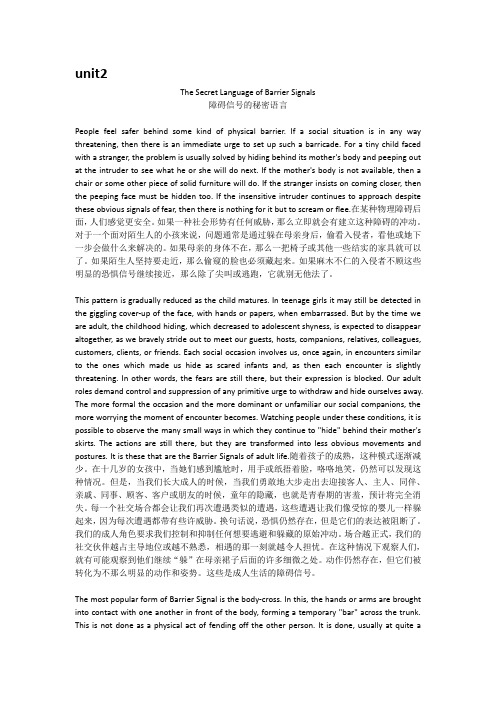
unit2The Secret Language of Barrier Signals障碍信号的秘密语言People feel safer behind some kind of physical barrier. If a social situation is in any way threatening, then there is an immediate urge to set up such a barricade. For a tiny child faced with a stranger, the problem is usually solved by hiding behind its mother's body and peeping out at the intruder to see what he or she will do next. If the mother's body is not available, then a chair or some other piece of solid furniture will do. If the stranger insists on coming closer, then the peeping face must be hidden too. If the insensitive intruder continues to approach despite these obvious signals of fear, then there is nothing for it but to scream or flee.在某种物理障碍后面,人们感觉更安全。
如果一种社会形势有任何威胁,那么立即就会有建立这种障碍的冲动。
对于一个面对陌生人的小孩来说,问题通常是通过躲在母亲身后,偷看入侵者,看他或她下一步会做什么来解决的。
《英语泛读教程(第二版)》第三册 unit 3 bursting the magic bubble课文翻译burstingthemagicbubble译文
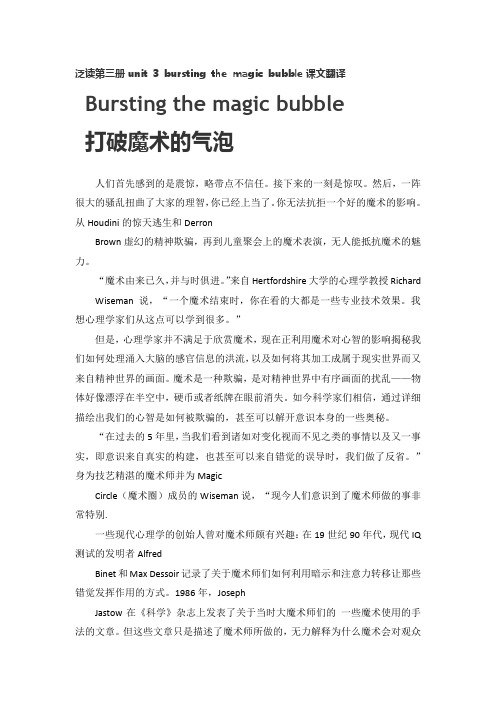
泛读第三册unit 3 bursting the magic bubble课文翻译Bursting the magic bubble打破魔术的气泡人们首先感到的是震惊,略带点不信任。
接下来的一刻是惊叹。
然后,一阵很大的骚乱扭曲了大家的理智,你已经上当了。
你无法抗拒一个好的魔术的影响。
从Houdini的惊天逃生和DerronBrown虚幻的精神欺骗,再到儿童聚会上的魔术表演,无人能抵抗魔术的魅力。
“魔术由来已久,并与时俱进。
”来自Hertfordshire大学的心理学教授Richard Wiseman说,“一个魔术结束时,你在看的大都是一些专业技术效果。
我想心理学家们从这点可以学到很多。
”但是,心理学家并不满足于欣赏魔术,现在正利用魔术对心智的影响揭秘我们如何处理涌入大脑的感官信息的洪流,以及如何将其加工成属于现实世界而又来自精神世界的画面。
魔术是一种欺骗,是对精神世界中有序画面的扰乱——物体好像漂浮在半空中,硬币或者纸牌在眼前消失。
如今科学家们相信,通过详细描绘出我们的心智是如何被欺骗的,甚至可以解开意识本身的一些奥秘。
“在过去的5年里,当我们看到诸如对变化视而不见之类的事情以及又一事实,即意识来自真实的构建,也甚至可以来自错觉的误导时,我们做了反省。
”身为技艺精湛的魔术师并为MagicCircle(魔术圈)成员的Wiseman说,“现今人们意识到了魔术师做的事非常特别.一些现代心理学的创始人曾对魔术师颇有兴趣:在19世纪90年代,现代IQ 测试的发明者AlfredBinet和Max Dessoir记录了关于魔术师们如何利用暗示和注意力转移让那些错觉发挥作用的方式。
1986年,JosephJastow在《科学》杂志上发表了关于当时大魔术师们的一些魔术使用的手法的文章。
但这些文章只是描述了魔术师所做的,无力解释为什么魔术会对观众产生这样的影响。
结果,人们对研究魔术中的心理学的兴趣消失了近一个世纪。
The American Character (I)翻译 英语泛读教程3(高等教育出版社)

参考译文1. 课文一2. 课文二Text 1The American Character (I)by Bradford SmithThe following is part of an essay taken from Bradford Smith's book, Why We Behave Like Americans. Success as a goal and materialism, according to Smith, are among the underlying factors that make up the American character. When visitors from abroad undertake to describe the American Character, the results are frequently puzzling to Americans."All Americans are Puritans; that's what's wrong with them," says one."They're always thinking aboutenjoying themselves," says another. "They spend too much time at work," a distinguished visitor tells us. "They don't know how to play." "Americans don't know what work is, " retorts another." Their machines do it all." "American women are shamelesssirens."─"No, they're prudes.""The children here are wonderful─outgoing and natural."─"Natural as little beasts. They have no manners, no respect for their elders." There is, of course, no single patternof American character any more than there is a single English or Turkish or Chinese character. Personality in America is further complicated by our diverse racial and cultural origins, by successive waves of immigration from all parts of the world, by our regional diversities. It is complicated by several 课文一 美国人的性格(一) 布拉德福德·史密斯以下节选自布拉德福德所著《为什么我们的举止象美国人》里的一篇文章。
英语泛读教程3第三册课文翻译UNIT13
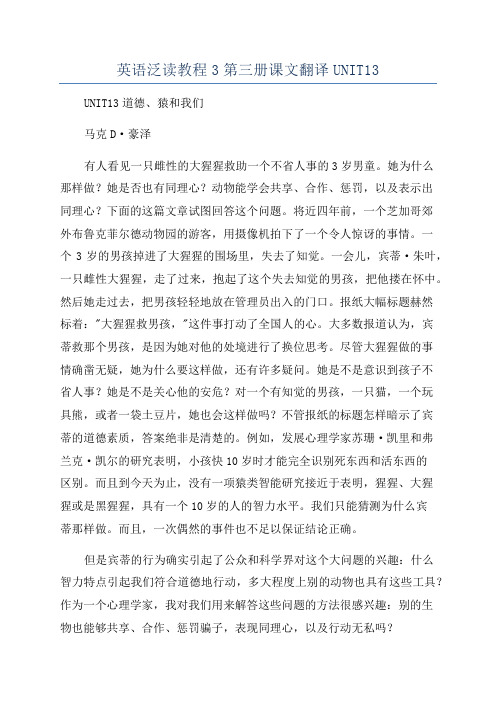
英语泛读教程3第三册课文翻译UNIT13 UNIT13道德、猿和我们马克D·豪泽有人看见一只雌性的大猩猩救助一个不省人事的3岁男童。
她为什么那样做?她是否也有同理心?动物能学会共享、合作、惩罚,以及表示出同理心?下面的这篇文章试图回答这个问题。
将近四年前,一个芝加哥郊外布鲁克菲尔德动物园的游客,用摄像机拍下了一个令人惊讶的事情。
一个3岁的男孩掉进了大猩猩的围场里,失去了知觉。
一会儿,宾蒂·朱叶,一只雌性大猩猩,走了过来,抱起了这个失去知觉的男孩,把他搂在怀中。
然后她走过去,把男孩轻轻地放在管理员出入的门口。
报纸大幅标题赫然标着:"大猩猩救男孩,"这件事打动了全国人的心。
大多数报道认为,宾蒂救那个男孩,是因为她对他的处境进行了换位思考。
尽管大猩猩做的事情确凿无疑,她为什么要这样做,还有许多疑问。
她是不是意识到孩子不省人事?她是不是关心他的安危?对一个有知觉的男孩,一只猫,一个玩具熊,或者一袋土豆片,她也会这样做吗?不管报纸的标题怎样暗示了宾蒂的道德素质,答案绝非是清楚的。
例如,发展心理学家苏珊·凯里和弗兰克·凯尔的研究表明,小孩快10岁时才能完全识别死东西和活东西的区别。
而且到今天为止,没有一项猿类智能研究接近于表明,猩猩、大猩猩或是黑猩猩,具有一个10岁的人的智力水平。
我们只能猜测为什么宾蒂那样做。
而且,一次偶然的事件也不足以保证结论正确。
但是宾蒂的行为确实引起了公众和科学界对这个大问题的兴趣:什么智力特点引起我们符合道德地行动,多大程度上别的动物也具有这些工具?作为一个心理学家,我对我们用来解答这些问题的方法很感兴趣:别的生物也能够共享、合作、惩罚骗子,表现同理心,以及行动无私吗?在一项1988年的研究中,苏黎世大学的人种学者爱德华·斯塔姆贝奇对长尾猕猴进行了一次试验,以测试它们控制攻击性的行为和相互合作的能力。
首先,每只猴子都接受一种训练,按一下一种装置上的杠杆,就能得到一把爆米花。
卓顶精文The-English-Reserve-and-Politeness-翻译-英语泛读教程-3(高等教育出版社)

参考译文1.课文一2.课文二Text1The English Reserve and Politeness ItseemstomanypeoplethattheBritishareextremelypoliteanddifficultt omakefriendswith.Hopefullythefollowingpassagewillhelpyoutohaveab etterunderstandingoftheBritishcharacter.TootherEuropeans,thebestknownqualityoftheBritishis"reserve".Ares ervedpersonisonewhodoesnottalkverymuchtostrangers,doesnotshowmuc hemotion,andseldomgetsexcited.Itisdifficulttogettoknowareservedp erson;henevertellsyouanythingabouthimself,andyoumayworkwithhimfo ryearswithouteverknowingwherehelives,howmanychildrenhehas,andwha thisinterestsare.Englishpeopletendtobelikethat.Iftheyaremakingaj ourneybybus,theywilldotheirbesttofindanemptyseat;ifbytrain,anemp tycompartment.Iftheyhavetosharethecompartmentwithastranger,theym aytravelmanymileswithoutstartingaconversation.Ifaconversationdoe sstart,personalquestionslike"Howoldareyou?"oreven"Whatisyourname ?"arenoteasilyasked.Questionslike"Wheredidyoubuyyourwatch?"or"Wh atisyoursalary?"arealmostimpossible.Similarly,conversationinBrit ainisingeneralquietandrestrainedandloudspeechisconsideredill-bre d. Thisunwillingnesstocommunicatewithothersisanunfortunatequalityin someways,sinceittendstogivetheimpressionofcoldness,anditistrueth attheEnglish(exceptperhapsintheNorth)arenotnotedfortheirgenerosi tyandhospitality.Ontheotherhand,theyareperfectlyhumanbehindtheir barrierofreserve,andmaybequitepleasedwhenafriendlystrangerorfore ignersucceedsforatimeinbreakingthebarrierdown. CloselyrelatedtoEnglishreserveisEnglishmodesty.Withintheirhearts ,theEnglishareperhapsnolessconceitedthananybodyelse,butintheirre lationswithotherstheyvalueatleastashowofmodesty.Self-praiseisfel ttobeill-bred.Ifapersonis,letussay,verygoodattennis,andsomeoneas kshimifheisagoodplayer,hewillseldomreply"Yes,"becausepeoplewillt hinkhimconceited.Hewillprobablygiveananswerlike,"I'mnotbad,"or"W ell,I'mverykeenontennis."Thisself-deprecationistypicallyEnglish, and,mixedwiththeirreserve,itoftenproducesasortofgeneralairofindi fferencewhichappearstoforeignersdifficulttounderstandandevenirri tating.ThefamousEnglishsenseofhumorissimilar.Itsstartingpointisself-dep recation,anditsgreatenemyisconceit.Itsidealistheabilitytolaughat oneself—atone'sownfaults,one'sownfailuresandembarrassments,even 课文一英国人的谨慎和礼貌在许多人看来,英国人极为礼貌,同他们交朋友很难。
- 1、下载文档前请自行甄别文档内容的完整性,平台不提供额外的编辑、内容补充、找答案等附加服务。
- 2、"仅部分预览"的文档,不可在线预览部分如存在完整性等问题,可反馈申请退款(可完整预览的文档不适用该条件!)。
- 3、如文档侵犯您的权益,请联系客服反馈,我们会尽快为您处理(人工客服工作时间:9:00-18:30)。
UNIT1新造词英语中每天都有新词出现。
你知道这些词是怎么产生的吗?阅读下文你就能找到造英语单词的各种方法。
学者们估计英语大约有600 000个单词,不过也许更多。
新的词语不断进入英语,其速度之快,大概没有一本字典能跟得上。
几个世纪以前,源于盎格鲁•撒克逊语、日尔曼语以及法语的原有词汇,占英语的五分之四。
余下的五分之一,一部分外来词组成,另外的部分由其它三种词组成,它们是:表示人名、地名的专有名词;象声词以及新造的词。
安培、伏特和瓦特都是电学的计量单位,它们都是用发现者的名字命名的,他们分别是是法国物理学家安德烈• M•安培、意大利物理学家阿勒森德罗•伏特、苏格兰工程师兼发明家詹姆士•瓦特。
今天我们都喝用巴氏灭菌法消毒的牛奶,这种奶即清又纯。
巴氏灭菌法便得名于法国医生路易斯•巴斯德,是他发明了消毒牛奶的制作方法。
在英语中像这样的词有许多。
象声词代表它们模仿的事物或行为的声音。
现举例如下:嗡嗡滴答砰砰咕哝喳喳嚎啕扑通啪啪嘀咕咯咯嘤嘤呼哧对于上述单词无需再作任何解释,因为它们不言自明。
或许你还可以想出更多类似的单词来。
接下来是新造的词。
讲英语的人总是根据需要创造词汇,而且每天仍在这样做。
一种新造的词是由另外两个词构成的。
字典里将这种词称为复合词。
如果把“玩耍”和“物品”放在一起,我们就可以得到复合词“玩具”。
你还能为下表添加多少类似的词呢?雨衣奶昔楼上停顿前灯关闭帆船楼下收入标题除了把两个词放在一起之外,我们还可以给单词添加一些成分,即前缀和后缀。
大多数前缀和后缀来自拉丁语和希腊语,而且它们都有自己特别的意义。
当我们在词的前面加前缀或在其后面加后缀时,我们就改变了它的意思。
例如,前缀re-意思为“再”。
如果把re-加到“作”或者“画”的前面,我们就得到了两个新词,意思为“再作一次”和“再画一次”。
Un-意思为“相反的”或者“不”。
把un-加到“快乐的”或者“和蔼的”前边,我们就得到了“不快乐”和“不和蔼”。
后缀-ness意思为“……状态”。
“happiness”和“kindness”指快乐和仁慈的状态。
这样就很容易理解“unhappiness”和“unkindness”两个词的意思了。
被加上前缀和后缀的词称为词根。
像“unkindness”一词的词根是“kind”。
有些词,如宇航员,完全是由希腊语或者拉丁语的前缀和后缀构成的。
Astro-是希腊语前缀,意思为“与星星有关”;naut-意思为“与航行有关”。
所以,宇航员就是“星球航行者”。
其它的词也可以成为词根、前缀或者后缀,这取决于它们在单词里所处的位置。
切记,前缀在最前面,词根其次,最后是后缀。
现以“图表”一词为例,通过添加前缀和后缀,或者将它本身作为一个前缀或者后缀,可以用它造出许多不同的新词来。
图表本身是指通过图画或者文字呈现出来的事物。
例如,你的老师可能想通过绘制一份阅读测试分数图表来了解你的读书过程,或者一个商人想通过绘制图表来显示他的公司销售纪录的变化。
现在,给图表这个词增加下表中列出的前缀和后缀,我们可以造出许多新词。
注意,图表一词除了本身是个后缀以外,还是另一个更长的后缀中的一部分。
前缀auto- 自己-bio- 生物,生平-phono- 声-photo- 光-tele- 远-后缀-graphy -学,-术-graph -书,写-ic -似的-ology -学-phone -声以下是由“graph”构成的词:autograph-签名;人们用手写的自己的名字biography-某人生平故事autobiography-个人撰写的自己生平的故事graphology-书法研究telegraph-远距离写作(电报)phonograph-用声音记录的文字和图片photograph-用光记录的文字和图片photography-拍摄照片的艺术graphic-清晰的书写或画的你可能已经注意到,没有graph一词,你也可以利用上面的某些前缀和后缀构成其它单词。
“biology”意思为对生命的研究。
那你认为“biologic”是什么意思呢?如果前缀anti-意思为“反”,那么“antibiotic”究竟是什么意思呢?在英语中有大量的拉丁语和希腊语前缀,造新词的可能性是无止境的。
每天,我们都有科学和技术的新发现,所以人们创造新的词汇去描述它们。
许多新词都是由已经在英语中存在了几个世纪的词根、前缀和后缀组合而成的。
另一种新造的词没有实际意义。
有些无实际意义的词只是被一些人使用一段时间,然后就从英语中彻底消失,再也不用了。
另外一些词被人们普遍接受,并且经过一段时间的使用之后,永远成为英语的一部分。
如果有相当多的人选择并赞同新造出的词的意思,这个词就被保留下来。
一些日常用的现代词,如:坏、大、少年、少女、聊天、工作和有趣,可能就是几个世纪前从无实际意义的词开始的。
语言学家猜测上述单词为无实际意义的词,因为他们无法从任何古代语言中对它们追根溯源。
谁发明的这些词?何时何地发明的?这些至今仍是个谜。
“迷惑”这词本身就是这些神秘词语中的一个。
没人知道这个词的出处是什么。
《爱丽丝漫游奇境》和《爱丽丝漫游镜中世界》的作者刘易斯•卡罗尔,是无实际意义词的伟大的发明家。
实际上,他造了一整套无实际意义的语言。
除了“咯咯地笑”这个词之外,卡罗尔发明的大多数无意义词并没有在英语中使用。
卡罗尔告诉我们:Chortle是吃吃地笑声和喷鼻息两个行为交叉在一起时发出的声音。
这个词把两个不同意义的词并在了一起。
字典中把这样的词称为混合词。
不幸的是,最近我们几乎天天听到的一个新的复合词是“烟雾”,这是烟和雾两种意思的组合。
某些声音似乎与所描述的事物或行为相吻合,人们将它们组合起来创造出无意义的词。
我们常常造词来代表很愚蠢的事情。
Spoof(傻话、哄骗)一词是五十多年前由一个英国喜剧演员造出来的。
它的意思是“用恶作剧的方式来取笑”。
Hornswoggle(隐瞒)一词十九世纪在美国被广泛使用,表示“欺骗”的意思。
如果一个不诚实的政客想对纳税人进行隐瞒,他就制造boondoggle(无价值的琐事),这是一个对任何人都没有好处的、无用的、昂贵的工程。
不久前,有人造出了gobbledygook(“官样文章”)一词。
当人们用冗长而无意义的词进行交谈或书写时,我们称之为官样文章。
不幸的是,许多人使用官样文章,是因为他们想让自己显得比实际更重要,或者是因为他们不想让人们了解他们的真正意图和他们的所作所为。
所以,当不诚实的政客想用“无价值的琐事”去“哄骗”群众时,他通常会用“官样文章”来敷衍。
在刘易斯•卡罗尔写书的年代,“官样文章”一词还没有造出来,但是如果当时已经有这个词的话,卡罗尔会知道它的确切含义的。
卡罗尔喜欢戏弄或嘲笑那些不喜欢用效果更好的简单词汇,而偏爱使用花哨的、大而不当的词的人。
《爱丽丝漫游镜中世界》的一个章节中,爱丽丝有一段与矮座椅沙发的对话,其中矮座椅沙发坚持认为:它想让词汇是什么意思词汇就是什么意思。
爱丽丝则坚持说这不可能。
如果每个人都这样做的话,那么没有人可以理解其他人了。
他们的对话如下:“但是‘荣誉’一词不是指‘一个恰当、有力的论点’,”爱丽丝反对道。
“我要用一个词的时候,”矮座椅沙发用一种相当轻蔑的口吻说,“我想让它是什么意思它就是什么意思--恰如其分。
”“但问题在于,”爱丽丝说,“你能不能让词代表那么多不同的事物。
”“问题是,”矮座椅沙发说,“谁是主人--仅此而已。
”正如矮座椅沙发所说,问题在于谁是主人。
矮座椅沙发以一种奇怪的方式来使用词汇,这使它成为一个“官样文章”大师,而不是语言大师。
一名语言大师知道词汇的真正含意及其出处;知道何时使用大的重要的词,何时使用短小但同样重要的简单的词。
温斯顿•邱吉尔是英国一位伟大的首相,他同时也是一位伟大的作家,一个真正的语言大师。
他曾经说道:“短小的词为佳;而既古老又短小的词为最佳。
”英语史我们现在所讲的英语曾经经历了三个阶段:古英语、中世纪英语和现代英语。
但是,早在古英语出现之前,许多其他语言已经产生,并得到发展。
据我们所知,其中最古老的语言是印欧语系。
远在石器时代人们就开始使用印欧语了。
在这个时期,一些印欧人就居住生活在英伦三岛上了。
英国最早的印欧人分为两族:苏格兰人和凯尔特人。
此外,还有一族叫做皮克特人,但他们不属于印欧语族。
以上三个民族便是今日所说的不列颠人。
石器时代的不列颠人骁勇好斗,连年互相发动战争。
他们用兽皮遮体,住在洞穴或原始的小木屋里。
他们有自己的语言。
石器时代的不列颠人以作战为生,与此同时,远在东部的希腊人却在创建欧洲伟大的文明。
当今艺术、文学、科学、哲学和政治学的许多思想都源于古代希腊人民的智慧。
当希腊文明达到了颠峰的时候,讲拉丁语的罗马人正在意大利创建着另一个伟大的文明。
罗马人征服了希腊,并将它划归罗马帝国的版图。
这时,他们发现了一个更为悠久的文化,一个比罗马文化希腊文化更为辉煌灿烂的文化。
于是,罗马人将它借鉴了过来。
在征服整个欧洲之后,罗马人开始对不列颠发动侵略战争,公元43年,使之成为罗马帝国的一部分。
罗马人给不列颠人带来了自己先进的文化,他们不仅带来了艺术、文学、法律和拉丁语,还创建学校,造房修路,供养一支军队保卫自己免遭外来侵略。
与此同时,位于北欧的日耳曼族人,又称“古代斯堪的纳维亚人”或“北方人”,正在发展自己独特的欧洲文化。
他们中的一些族落成为后来人们熟知的盎格鲁人、撒克逊人、朱特人和哥特人。
他们是战士,但也是水手和商人。
很早以前,盎格鲁人和撒克逊人就开始同英格兰的凯尔特人做生意了。
这或许是不列颠人第一次同外族人进行交往。
在不列颠作为罗马帝国一部分的四百年间,罗马日渐势微,而古代斯堪的纳维亚人则日益强大。
最后,他们终于以势如破竹之威,冲破罗马帝国北部边界的防线。
除了来自北方的入侵,蒙古人又从东部发起进攻,穆斯林人也从南部入侵。
罗马四面受敌,只得调遣军队来保卫帝国仅存的部分。
到了公元409年,罗马完全丧失了对不列颠的统治权。
罗马军队刚刚撤离不列颠,皮克特人和苏格兰人便着手消灭凯尔特人。
凯尔特人只得向隔着大海居住在挪威和丹麦的盎格鲁人和撒克逊人求助。
后者热衷于战争,迅速做出反应。
他们解救了凯尔特人,实际上也摧毁了罗马人带来的文化:包括文学、雕塑、学校和道路。
盎格鲁人和撒克逊人的日尔曼语混合在一起就成了盎格鲁•撒克逊语。
自从盎格鲁人和撒克逊人成为英格兰的统治者,盎格鲁•撒克逊语便成为最早的英语。
盎格鲁•撒克逊人在英格兰建立了他们的政权,他们的语言也随之成为这个国家的主要语言;而与此同时,罗马帝国陷入越来越深的困境。
到公元476年,西罗马便不复存在了。
日尔曼人无意保留罗马文化,因而罗马文化自此消亡。
教堂是罗马文明仅存之物。
不过,拉丁语作为宗教人士、上层阶级和知识阶层的语言,仍被继续使用,并将对南欧国家和英国的语言发展产生深远的影响。
